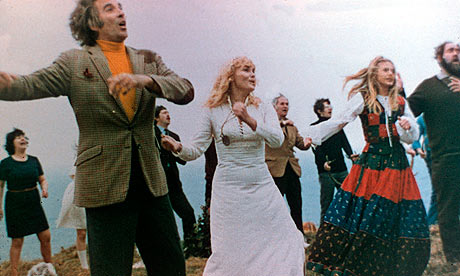The Wicker Man as a Musical
Last night I watched The Wicker Man, the 1973 cult horror film starring Christopher Lee, Edward Woodward, and Britt Ekland. Shot in Scotland, it follows an uptight police sergeant as he searches for a missing child on an island whose populace has reverted to scenic British pagan rituals.
And all throughout the movie, till the very last scene, I was thinking, “This is an effin’ musical!” The cast keeps breaking into song and dance. Not the uptight sergeant, of course, but everybody else from the local schoolboys dancing around the Maypole to Lee at his piano and Ekland (and her body double) in nothing at all. Those musical scenes do more to reveal character than most of the spoken dialogue—though of course most of the characters are hiding something.
In that respect, The Wicker Man plays like an inverse of The Music Man. In Meredith Wilson’s masterpiece the stranger brings music to a community, while in Anthony Shaffer’s story the stranger finds a disturbing community already absorbed by music. In both cases, the community absorbs the stranger in its own way.
I see by the web that the National Theater of Scotland actually decided to adapt The Wicker Man into a stage musical earlier this year. The Guardian reported, “Previous attempts to stage The Wicker Man have stalled over failure to secure the rights to the music. [Co-writer Greg] Hemphill proudly promises that their version will feature every note of the original.” That soundtrack included genuine folk songs and new compositions by Paul Giovanni. I doubt the stage can get the eerie effect of bad lip-synching, though.
On the other hand, the Guardian’s Danny Leigh really didn’t like the sing-along Wicker Man screenings two years ago. Horror films and musicals are supposed to be two different kinds of fun.
And all throughout the movie, till the very last scene, I was thinking, “This is an effin’ musical!” The cast keeps breaking into song and dance. Not the uptight sergeant, of course, but everybody else from the local schoolboys dancing around the Maypole to Lee at his piano and Ekland (and her body double) in nothing at all. Those musical scenes do more to reveal character than most of the spoken dialogue—though of course most of the characters are hiding something.
In that respect, The Wicker Man plays like an inverse of The Music Man. In Meredith Wilson’s masterpiece the stranger brings music to a community, while in Anthony Shaffer’s story the stranger finds a disturbing community already absorbed by music. In both cases, the community absorbs the stranger in its own way.
I see by the web that the National Theater of Scotland actually decided to adapt The Wicker Man into a stage musical earlier this year. The Guardian reported, “Previous attempts to stage The Wicker Man have stalled over failure to secure the rights to the music. [Co-writer Greg] Hemphill proudly promises that their version will feature every note of the original.” That soundtrack included genuine folk songs and new compositions by Paul Giovanni. I doubt the stage can get the eerie effect of bad lip-synching, though.
On the other hand, the Guardian’s Danny Leigh really didn’t like the sing-along Wicker Man screenings two years ago. Horror films and musicals are supposed to be two different kinds of fun.



No comments:
Post a Comment